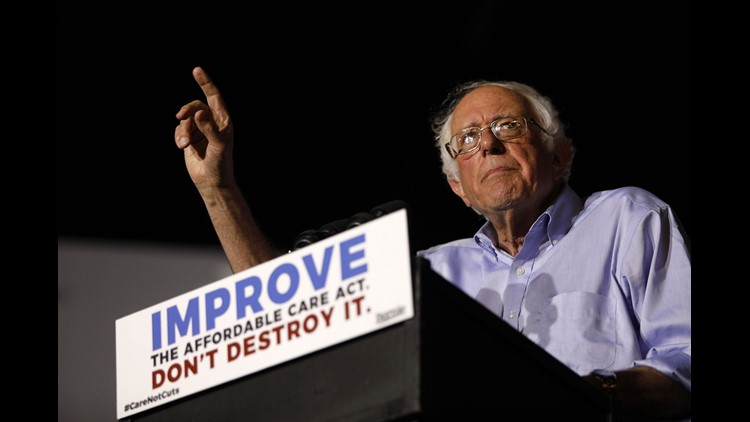WASHINGTON D.C. — When did this in 2013, he did it alone.
Nearly four years later, Sanders is set to introduce a new “Medicare for all” health care bill with nearly a third of the Senate Democratic caucus by his side.
The legislation will be unveiled on Wednesday afternoon in Washington, a little more than six weeks after the party’s all-hands fight to preserve Obamacare secured a narrow reprieve on the Senate floor. Sanders’ plan, though dead-on-arrival in a Republican-controlled Congress, will offer a blueprint for fundamentally reshaping the American health care system by moving the country to a government-run, single-payer program.
Under Sanders’ proposal, Americans would receive a “Universal Medicare card” that would be a ticket to a comprehensive health care services, including hospital stays, doctor visits, substance abuse treatment, dental, vision and reproductive care — including abortion.
However, consumers may have to pay up to $250 out-of-pocket for prescription drugs, with incentives to use generic medications. Sanders, who’s been vocal about lowering drug prices, would allow the government to negotiate with pharmaceutical companies.
Long-term care, which Sanders had included in the version he unveiled during his presidential campaign last year, will not be covered. It will be addressed in separate legislation, an adviser to Sanders told CNN.
The bill calls for the elimination of premiums for private health insurance, deductibles and co-pays. However, most Americans and businesses will pay what Sanders says is a much smaller share of their income to fund the program.
While the new legislation has not yet been scored, the program Sanders pitched on the campaign trail came with an estimated annual price tag of nearly $1.4 trillion, to be paid for in part by a proposed new 2.2% income tax on all Americans, a 6.2% levy on employers and a further round of tax hikes on the wealthy.
Sanders’ plan does address one of the stickier questions facing such proposals: how to phase out the current system, which depends primarily on employer-sponsored private plans, without creating a disruption in care.
The answer, according to this new version of the bill, is to roll it out over a four-year transition period, a process that New York Sen. Kirsten Gillibrand and her office took a big hand in crafting.
The law would beef up Medicare — adding dental, vision and hearing aid coverage — in its first year, while reducing the eligibility age to 55. Children, up to age 18, would also be offered immediate access to the government-run plan. Over the next two years, the Medicare age would drop to 45, then 35 years old. By the fourth year, everyone would be eligible.
Despite the considerable legislative obstacles in its way, single-payer as a concept is gaining traction among the public. Some 53% of Americans support a national health care plan, according to a June poll by the Kaiser Family Foundation. That’s up from 50% last year and from 40% between 1998 and 2000.
It is also notably increasing in popularity with some of the most ambitious Democratic officeholders — a group of Senators tipped to run for the party’s presidential nomination in 2020.
California Sen. Kamala Harris was the first to announce plans to cosponsor the bill, followed by Massachusetts Sen. Elizabeth Warren. New Jersey Sen. Cory Booker and Gillibrand made their plans public on Monday and Tuesday. The names, some expected, others less so, rolled in over the past 48 hours.
Notable absences, however, included Senate Minority Leader Chuck Schumer, Ohio Sen. Sherrod Brown, California Sen. Dianne Feinstein and the party’s 2016 vice presidential nominee, Virginia Sen. Tim Kaine. Of the latter three, all up for reelection in 2018, only Brown is expected to face a serious Republican challenge.
Single-payer activists, mostly from the progressive grassroots movement that fueled Sanders’ 2016 presidential campaign, are delighting in a sense of momentum after years stuck on the margins of the debate.
“This is an especially gratifying moment for the tens of thousands of nurses across the US who have dedicated years of effort to transform our health care system from an profiteering industry based on greed and suffering to patient need and healing,” National Nurses United executive director RoseAnn DeMoro said in a statement.
She called the bill’s introduction a “direct product of how Sen. Sanders made Medicare for all, and healthcare as a human right, such a signature issue of his campaign.”



